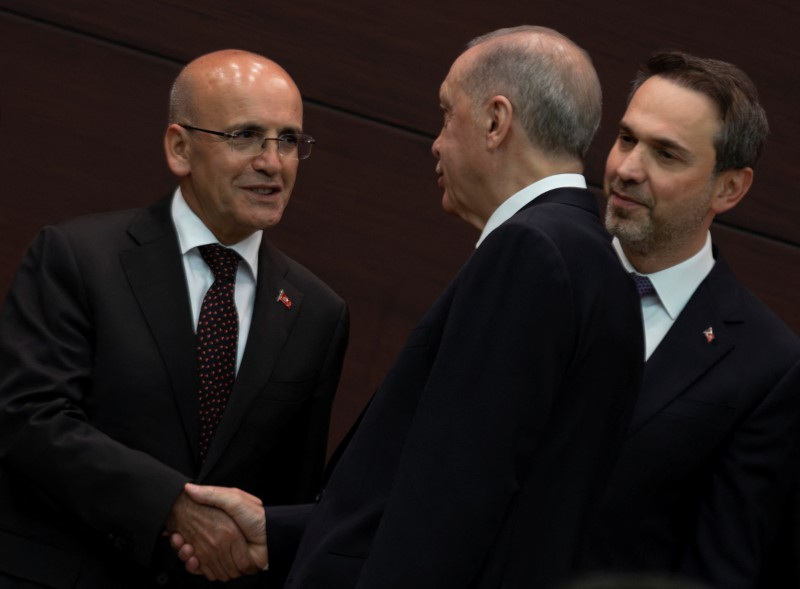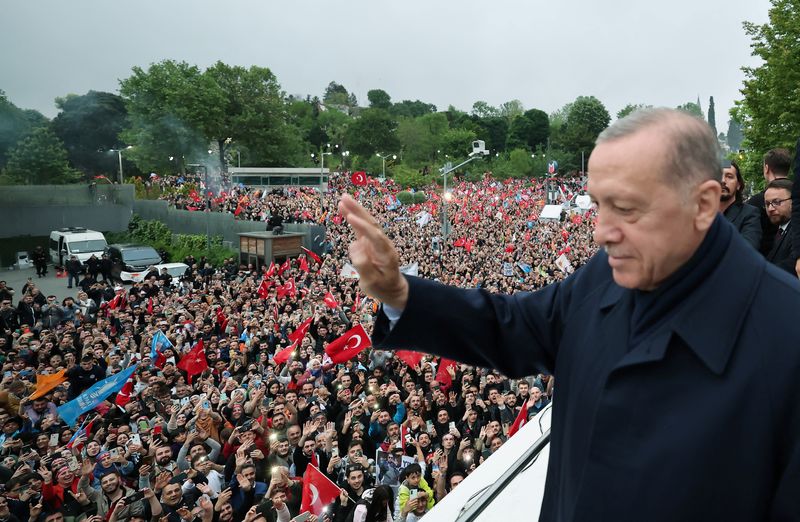By Huseyin Hayatsever and Ezgi Erkoyun
ANKARA (Reuters) -President Tayyip Erdogan signalled on Saturday his newly-elected government would return to more orthodox economic policies when he named Mehmet Simsek to his cabinet to tackle Turkey's cost-of-living crisis and other strains.
Simsek's appointment as treasury and finance minister could set the stage for interest rate hikes in coming months, analysts said - a marked turnaround from Erdogan's longstanding policy of slashing rates despite soaring inflation.
After winning a runoff election last weekend, Erdogan, 69, who has ruled for more than two decades, began his new five-year term by calling on Turks to set aside differences and focus on the future.
Turkey's new cabinet also includes Cevdet Yilmaz, another orthodox economic manager, as vice president, and the former head of the National Intelligence Organisation (MIT) Hakan Fidan as foreign minister, replacing Mevlut Cavusoglu.
Erdogan's inauguration ceremony at Ankara's presidential palace was attended by NATO Secretary-General Jens Stoltenberg, Venezuelan President Nicolas Maduro and other dignitaries and high-level officials.
The apparent U-turn on the economy comes as many analysts say the big emerging market is heading for turmoil given depleted foreign reserves, an expanding state-backed protected deposits scheme, and unchecked inflation expectations.
Simsek, 56, was highly regarded by financial markets when he served as finance minister and deputy prime minister between 2009 and 2018.
Reuters reported earlier this week Erdogan was almost certain to put him in charge of the economy, marking a partial return to more free-market policies after years of increasing state control of forex, credit and debt markets.
QUESTION OF INDEPENDENCE
Analysts said that after past episodes in which Erdogan pivoted to orthodoxy only to quickly return to his rate-cutting ways, much would depend on how much independence Simsek is granted.
"This suggests Erdogan has recognised the eroding trust in his ability to manage Turkey’s economic challenges. But while Simsek’s appointment is likely to delay a crisis, it is unlikely to present long-term fixes to the economy," said Emre Peker, a director at Eurasia Group covering Turkey.
"Simsek will likely have a strong mandate early in his tenure, but face rapidly increasing political headwinds to implement policies as March 2024 local elections draw near."
Erdogan's economic programme since 2021 stresses monetary stimulus and targeted credit to boost economic growth, exports and investments, pressing the central bank into action and badly eroding its independence.
As a result, annual inflation hit a 24-year peak beyond 85% last year before easing.
The lira has lost more than 90% of his value in the last decade after a series of crashes, the worst in late 2021. It hit new all-time lows beyond 20 to the dollar after the May 28 vote.
'WAYS TO RECONCILE'
Turkey's longest-serving leader, Erdogan won 52.2% support in the runoff, defying polls that predicted economic strains would lead to his defeat.
His new mandate will allow Erdogan to pursue the increasingly authoritarian policies that have polarised the country, a NATO member, but strengthened its position as a regional military power.
At the inauguration ceremony, attended by Hungarian Prime Minister Viktor Orban and Armenian Prime Minister Nikol Pashinyan, Erdogan struck a conciliatory tone.
"We will embrace all 85 million people regardless of their political views ... Let's put aside the resentment of the election period. Let's look for ways to reconcile," he said.
"Together, we must look ahead, focus on the future, and try to say new things. We should try to build the future by learning from the mistakes of the past."
Earlier, reading out the oath of office, Erdogan vowed to protect Turkey's independence and integrity, to abide by the constitution, and to follow the principles of Mustafa Kemal Ataturk, founder of the modern secular republic.
Erdogan became prime minister in 2003 after his AK Party won an election in late 2002 following Turkey's worst economic crisis since the 1970s.
In 2014, he became the country's first popularly elected president and was elected again in 2018 after securing new executive powers for the presidency in a 2017 referendum.

The May 14 presidential election and May 28 runoff were pivotal given that the opposition had been confident of ousting Erdogan and reversing many of his policies, including proposing sharp interest rate hikes to counter inflation, running at 44% in April.
In his post-election victory speech, Erdogan said inflation was Turkey's most urgent issue.
(Writing and additional reporting by Jonathan Spicer; Editing by Frances Kerry, Giles Elgood and Christina Fincher)
